Discover the authentic flavors of the Middle East at establishments we've selected for their authenticity, atmosphere, and impeccable reputation. The aroma of cardamom coffee and sizzling meat on the grill blends with the salty air of the bay. You stand in a cozy courtyard of the Old Town, while just a few kilometers away glass skyscrapers pierce the sky. It is precisely in this contrast that lies the secret of Dubai's gastronomic allure, a city where the culinary scene runs much deeper than it initially appears. Forget stereotypes about restaurants on the 50th floor, we're embarking on a true journey through Middle Eastern flavors.
What is Middle Eastern cuisine? It's a kaleidoscope of tastes: the tangy freshness of Lebanese mezze, the smoky aroma of Syrian kebabs, the sweet notes of Emirati breakfasts... In Dubai, all this culinary treasure is gathered in one place. This city is your personal gateway into the region's gastronomic world. And this guide is your key, opening the right doors, whether it's a luxurious restaurant or a tiny kebab shop with half a century of history.
Our Сompass: Why These Places?
Dubai has hundreds of Arab restaurants. To avoid getting lost in this sea of hummus and kebabs, we armed ourselves with a strict compass. Only those establishments that meet four main criteria made it onto our shortlist:
- Uncompromising taste: Food must be not just tasty, but authentic. We searched for places that honor recipes, don't skimp on fresh ingredients, and where the chef puts their soul into each dish.
- An atmosphere you can't fake: You can easily eat at home. We chose establishments with character, whether it's the luxury of a sultan's palace or the charming chaos of a family-run kebab restaurant.
- Popular opinion and professional reviews: We checked both TripAdvisor ratings and verdicts from restaurant critics. The list includes only those loved by both guests and experts.
- Fair pricing: Prices should match the level. We're fine paying more for high art, but even an affordable kebab should be the best for its price.
Icons of Fine Dining – Luxury and Tradition
In this section, we've gathered premium restaurants where centuries-old Middle Eastern recipes come to life in exquisite settings. They are the perfect choice for special occasions.
Al Nafoorah – Lebanese classics in palace splendor
The interior of Al Nafoorah, located in the Jumeirah Zabeel Saray hotel, instantly transports you into the ambiance of a sultan's palace. High carved arches, soft lighting from Arabic lanterns, and rich fabrics create an atmosphere of genuine palace-like magic, where luxury is felt in every detail yet never overwhelms. The cuisine here is a benchmark of classic Lebanese cooking. The menu offers a wide selection of cold and hot mezze, from delicate hummus to spicy makaneek sausages, as well as perfectly grilled kebabs whose juices drip onto toasted bread. To fully appreciate the variety of flavors, be sure to order a large assortment of mezze. And the local hummus topped with spiced minced meat is a benchmark of creamy delicacy, worth returning for alone.
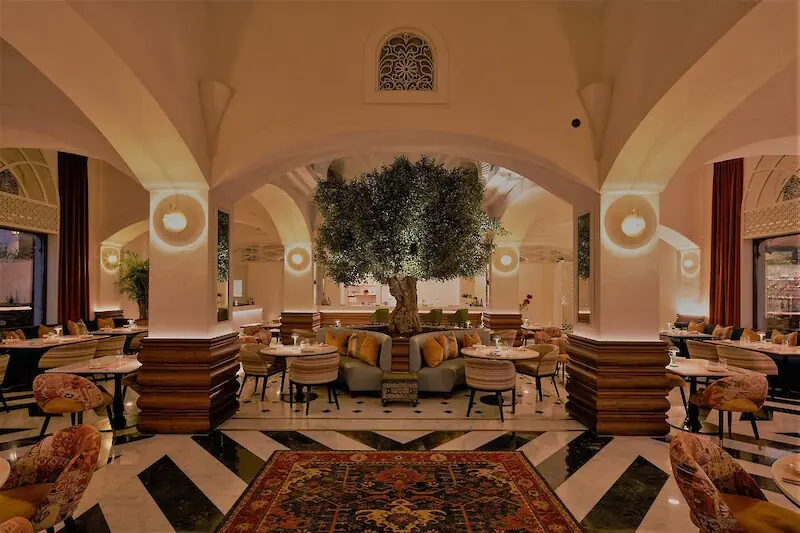
When should you visit?: This place is perfect for a romantic dinner, celebrating an important event, or experiencing Lebanese cuisine in its most elegant and impeccable form.
Ninive – The magic of an Arabian night under the stars
The restaurant Ninive, located at the base of Jumeirah Emirates Towers, offers a truly unique experience. It's styled as a Bedouin tent, a genuine oasis amidst the futuristic skyscraper landscape. As darkness falls, this place transforms into a setting straight out of a Sinbad adventure movie: flickering lantern light highlights Persian carpets and clouds of aromatic smoke from hookahs, while above, real stars and skyscraper lights shine overhead. The menu features bold fusion cuisine, where familiar recipes from the Middle East and North Africa receive unexpected, modern interpretations. For example, traditional tagine here might be prepared with confit duck, and quinoa added to the fattoush salad.
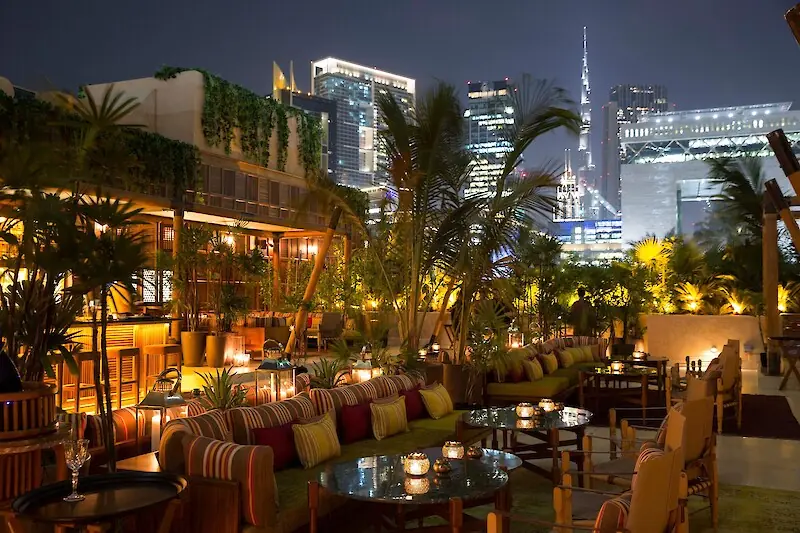
Tip: Don't miss the opportunity to try their signature cocktails with oriental spices—they will be the perfect complement to the magical atmosphere of this place.
The Heart of the City – Authentic Flavors and History
To truly feel the pulse of Dubai, head to places where locals eat. These establishments lack flashy glamour, but they have soul, history, and that very "homely" food whose taste lingers in memory for a long time.
Arabian Tea House – A journey into Dubai's past
This place is a real portal to the past, a time machine hidden within the labyrinth of the historic Al Fahidi district. As soon as you step inside, the hustle and bustle of the modern metropolis fades away, replaced by the rustling of leaves and the clinking of tea cups. You enter a sunlit courtyard, where a white gravel path, simple turquoise furniture, and bougainvillea vines create an almost rustic tranquility. Arabian Tea House specializes in traditional Emirati cuisine. It is one of the best places in the city to try a genuine local breakfast: sweet vermicelli with omelet (Balaleet) and fluffy bread rolls (Khameer bread). Be sure to order the traditional Emirati breakfast and their signature mint tea; to fully immerse yourself in the atmosphere, try Arabic coffee—gahwa.
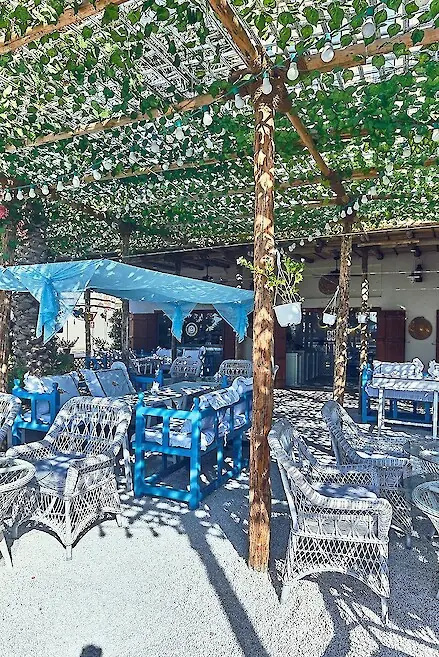
Fact: Did you know? The Arabian Tea House is one of Dubai's first authentic Emirati restaurants, which has since become a true landmark of the Old Town.
Al Ustad Special Kabab – A timeless legend
At Al Ustad, people come not for the interior but for the food, especially for the legendary kebabs. Thanks to a secret marinade recipe that the family has kept for decades, the meat here melts in your mouth, leaving a spicy aftertaste of yogurt and saffron. Located in the bustling Bur Dubai area, this restaurant has a rich history. Don't look for designer flair here; the entire decor consists of thousands of photographs on the walls, allowing you to dine side by side with celebrities and ordinary working-class people. This charming chaos is the soul of the place. To taste the best, try a mix of different types of kebabs, especially recommending Joujeh Kebab (chicken) and Kabab Khas (lamb).
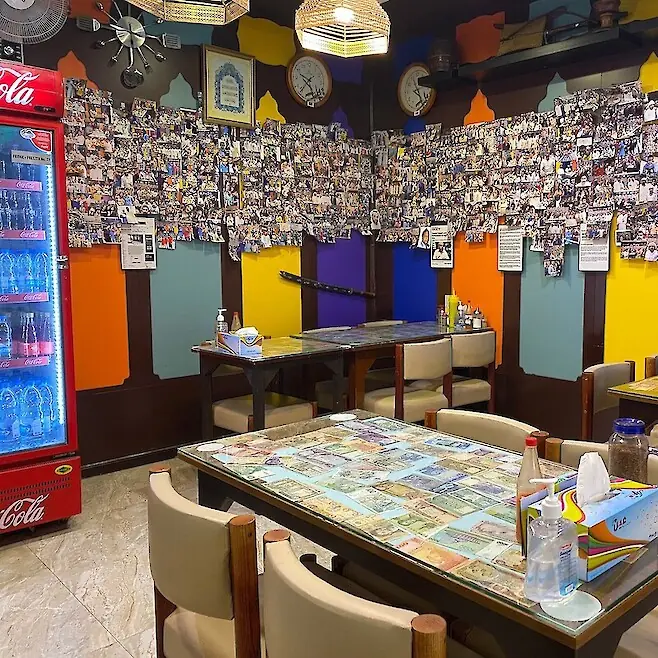
Warning: Be prepared that it is almost always crowded and noisy here, and you may have to wait in a short queue. The atmosphere is very simple, and payment is often accepted only in cash.
Planning Your Visit: Practical Tips
To make your gastronomic experience as enjoyable as possible, consider a few practical points.
Reservations, dress code, and etiquette
- Reservations: For high-end restaurants such as Al Nafoorah and Ninive, it's necessary to book in advance, especially if you plan to visit on weekends (Friday or Saturday evenings). For more casual establishments like Arabian Tea House or Al Ustad, reservations are usually not required.
- Dress Code: Smart casual attire is suitable for upscale restaurants. In authentic cafes, you can dress more casually, but always with respect for local culture—covering shoulders and knees is advisable.
- Tipping: In Dubai, it is customary to leave a tip of 10-15% of the bill amount if service charges have not already been included.
Budget: What to expect?
We have divided the restaurants from our list into three price categories to help you navigate more easily:
- Fine Dining ($$$): Al Nafoorah, Ninive.
- Authentic Restaurants ($$): Arabian Tea House.
- Historic Establishments ($): Al Ustad Special Kabab.
Please note: all prices are approximate, and subject to change. We strongly recommend checking current prices and menus on the official restaurant websites before visiting.
Cultural context: Ramadan and alcohol
- Ramadan: During the holy month of Ramadan for Muslims, many restaurants change their operating hours. Typically, they are closed during the day and open only after sunset for iftar (the evening meal to break the fast).
- Alcohol: Remember that alcoholic beverages in Dubai are served only in establishments with a special license—usually hotels. Therefore, at Al Nafoorah and Ninive you can order wine or cocktails, while Arabian Tea House and Al Ustad will not have alcohol on their menus.
Important: Rules during Ramadan: During the daytime, eating, drinking, and smoking are prohibited in public places during Ramadan. Be sure to check restaurant opening hours in advance, as they may differ significantly from regular hours.
Your choice: Sultan or Bedouin?
So what should you choose: dinner in the luxury of a palace-style restaurant or kebabs in a bustling eatery where history oozes from the walls? The answer is simple: don't choose. Dubai's gastronomy is beautiful precisely because of its diversity, and to truly understand it, you need to experience both flavors—the sweet taste of luxury and the spicy taste of history. Use our guide as a starting point. Book a table at one place, and drop by another spontaneously. After all, the best food is the one that becomes part of your personal adventure and the most vivid memory of your trip. Enjoy your meal, or as they say in the Middle East, Sahtain.
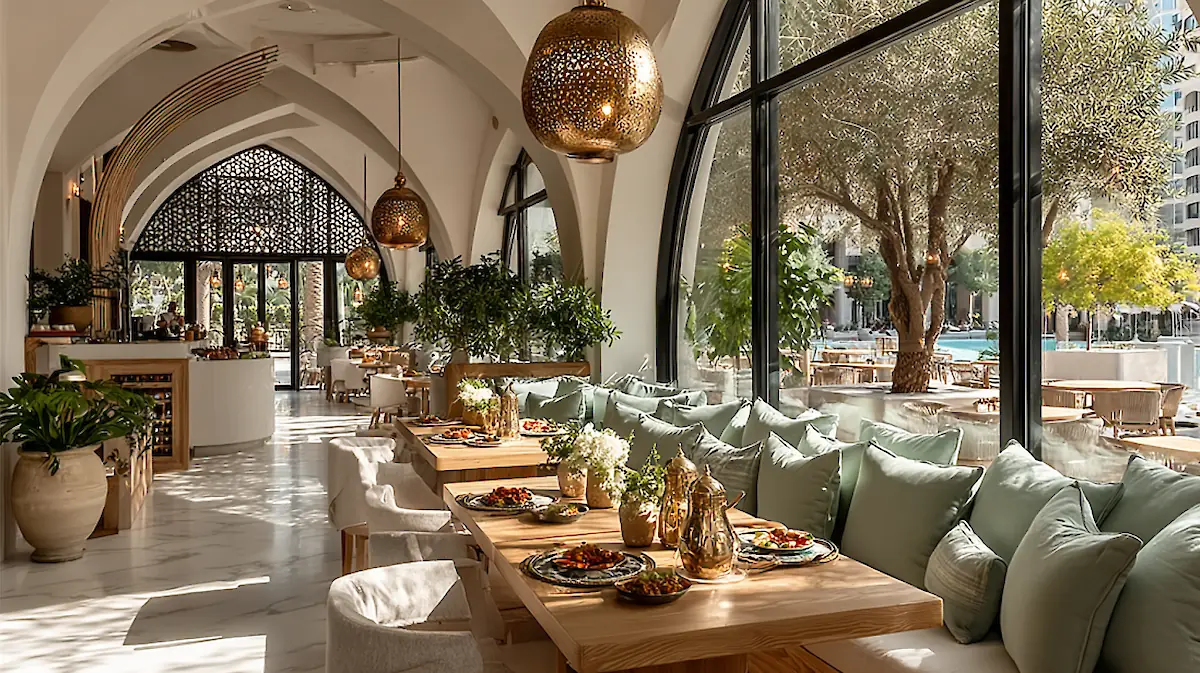
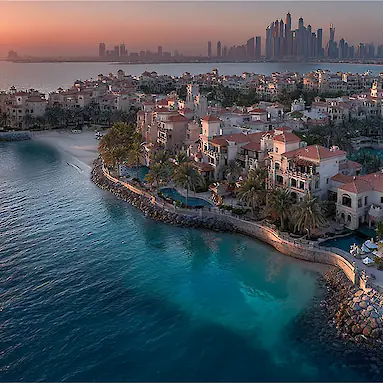










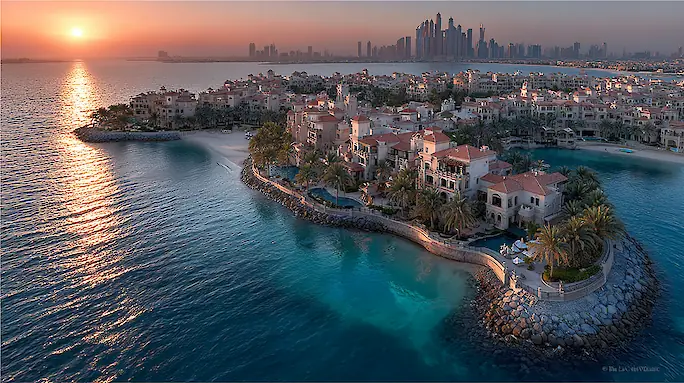










Comments